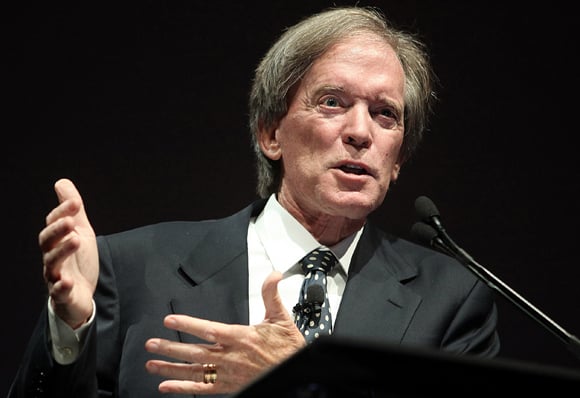Bill Gross's Pimco Total Return Bond Fund, which is having its worst run this year since at least 1995, regained its spot among top bond funds last month as investors returned to riskier assets.
The $244 billion Total Return fund, the world's biggest mutual fund, rose 1.7 percent in the past month, beating 93 percent of rivals and accounting for almost half of the fund's 3.6 return so far this year, according to data compiled by Bloomberg.
Gross, who last month told clients he hasn't lost his touch after missing the biggest quarterly rally in Treasuries since 2008, was helped by a rebound in riskier assets such as corporate credit and non-U.S. holdings. Total Return has 21 percent of assets in corporate debt and 33 percent in securities outside the U.S., and owns inflation-linked bonds that rise with expectations for higher consumer prices.
“Expectations of gradually higher inflation have favored TIPS versus nominal Treasuries as well as corporate/financial bonds,” Gross wrote in an e-mailed response to questions. “In addition, holdings in the U.K. have benefited from their quantitative easing program.”
Gross has trailed 71 percent of competing funds in 2011 after he got out of Treasuries in the early part of the year, missing a rally when investors rushed to the safety of government-backed debt amid the European sovereign-debt crisis. That's his worst performance relative to peers since at least 1995, the earliest year for which Bloomberg has rankings for the fund.
In a letter to clients last month titled “Mea Culpa,” Gross said he misjudged the extent of the economic slowdown and as a result, the fund “had too little risk off and too much risk on.” After eliminating Treasuries from his fund in February, Gross has since gradually built his position in U.S. government debt to 16 percent as of the end of September.
Gross, the co-chief investment officer of Newport Beach, California-based Pacific Investment Management Co., has said the Federal Reserve's willingness to increase debt purchases as it tries to spur the economy would boost the inflation rate.
TIPS, or Treasury Inflation Protected Securities, returned 1.47 percent in the past month, according to Bank of America Merrill Lynch indexes. Nominal Treasuries lost 0.9 percent in the same period, while corporate debt gained 1.47 percent.
RELATED ITEM Bonds beat stocks over thirty years for first time since Civil War
RELATED ITEM The top 10 divididen-paying ETFs
In the United Kingdom, the combination of Prime Minister David Cameron's fiscal austerity and Bank of England Governor Mervyn King's efforts to bolster the economy with bond purchases and record-low interest rates are attracting investors seeking a haven from Europe's debt crisis. That boosted the pound and government bonds.
Equities rebounded from five straight months of losses in October, and high-yield debt rose, after European leaders appeared closer to a resolution of the debt crisis and numbers showed the U.S. economy had grown at the fastest pace in a year. The Standard & Poor's 500 Index rallied 11 percent in October, while high-yield bonds rose 5.96 percent and Treasuries lost 0.69 percent.
“Being over-committed to corporate debt helped in October because it was a terrible month for Treasuries,” Jeff Tjornehoj, an analyst with Lipper Inc in Denver, said in an interview.
Tjornehoj said investors should be looking at longer-term performance numbers, ideally three years or more, to gauge how fund managers have performed over a market cycle. Gross's Total Return Fund has advanced at an average annual rate of 8 percent over the past five years, beating 97 percent of peers.
--Bloomberg News







